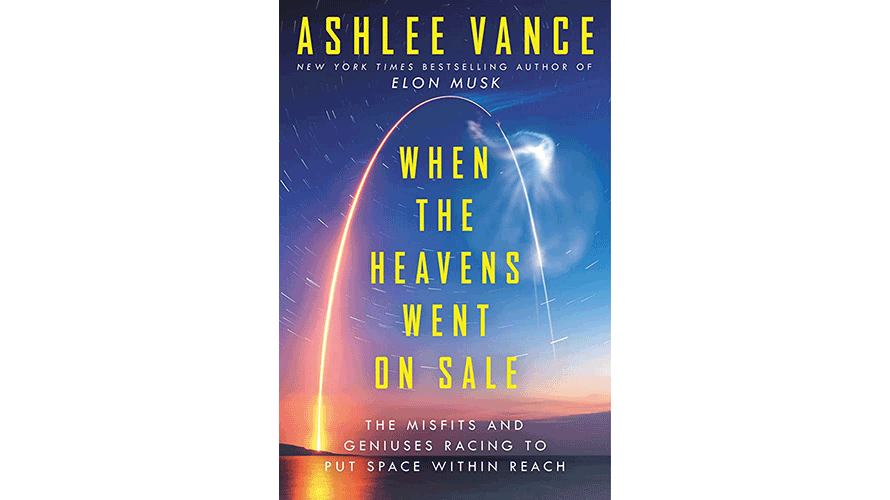Category: Nonfiction
Reviewed by: Casey Suire
Title: When the Heavens Went on Sale: The Misfits and Geniuses Racing to Put Space Within Reach
Author: Ashlee Vance
Format: Hardcover/Kindle
Pages: 528
Publisher: Ecco
Date: May, 2023
Retail price: $31.50/$16.99
ISBN: 978-0062998873
Find this book
This is one of the best books ever written about NewSpace. Ashlee Vance’s new book, When the Heavens Went on Sale, is an incredibly entertaining account of today’s space industry. Vance previously wrote an autobiography about Elon Musk. This time, Vance writes about launching satellites into orbit. Lots and lots of satellites.
The book profiles four space companies: Planet Labs (later “Planet”), Rocket Lab, Astra, and Firefly Aerospace. Whereas Planet manufactures Earth-imaging satellites, the other three firms build rockets. Due to advances in electronics and computing technology, satellites are now smaller and cheaper than ever before. The rockets designed to launch them are small as well. As a result, the number of satellites being launched into low Earth orbit (LEO) is increasing at a staggering rate that shows no signs of slowing down anytime soon.
Today’s small satellites perform many tasks that benefit people on Earth. Examples in the book include providing high-speed internet, studying deforestation in the Amazon, and monitoring military conflicts in other countries. At the same time, however, this increase in activity has attracted criticism. Many fear that more satellites will hurt astronomy and increase the risk of two spacecraft colliding in orbit.
Furthermore, there are pros and cons to building such small rockets to launch satellites. The most obvious problem is the small payload capacity. Bigger rockets can launch a larger quantity of small satellites in just one attempt, resulting in a lower cost per pound than a small launcher. For instance, in January 2021, a SpaceX Falcon 9 rocket launched a whopping 143 satellites into orbit. At the time of this writing, this is the most satellites ever launched on one rocket. Even larger launch vehicles currently in development could eventually smash this record. Then again, flights on a small rocket can be scheduled much quicker than rideshare missions with over a hundred satellites. A customer doesn’t have to wait until a bigger rocket gets filled with other satellites. A smaller launcher can be tailored to their needs.
In any case, Vance provides a fascinating look at the smallsat industry. He acknowledges that When the Heavens Went on Sale is the product of five years of space reporting. This is not a book that was rushed into publication. Vance clearly put a lot of thought and effort into his work. The book is so well-written and thrilling that readers won’t mind or even notice that it is over 500 pages long. He was able to interview several key figures from all four space companies. The founders of Astra even allowed Vance to follow and record the company’s every move.
Not a single individual Vance interviewed for the book is boring, and this resulted in plenty of colorful and somewhat crazy stories. For example, there’s the Rainbow Mansion commune, where many employees of NASA’s Ames Research Center, including the founders of Planet, lived together. There is another story about how a young Peter Beck, founder of Rocket Lab, built a rocket-powered bike as a young man in New Zealand. He even won a race against a Dodge Viper. Beck’s early introduction to rocketry is very impressive considering that Rocket Lab launched a small spacecraft to the Moon last year. Currently, the company is also planning missions to Venus and Mars.
A lot of the book’s fun comes from comparing and contrasting each company’s culture and way of doing things. Competition is fierce, and each company’s leadership loves to mock their rivals. Many even shared their criticisms while being interviewed by Vance. There are arguments between Rocket Lab and Astra regarding the quality of their respective rockets. There’s also the issue of how much mass each company’s rocket can haul into orbit. For example, Max Polyakov of Firefly noted that his company’s Alpha rocket is much bigger than Rocket Lab’s Electron vehicle.
Since this is a book about satellites and not astronauts, very little is said about the human settlement of space. Some company leaders, for example, believe sending people to Mars is an interesting idea. However, they also show more interest in their own efforts to commercialize low Earth orbit. Others, such as some of the founders of Planet, belong to an organization called the Open Lunar Foundation that wants to establish a human settlement on the Moon.
Reading about Vance’s interactions with several Astra employees is also very interesting. Some are true believers in the future of space exploration. Others, on the other hand, view what they do as just a job. Regardless of their beliefs, these interviews are memorable. Rather than reading comments from a legendary NASA astronaut, a famous space engineer or scientist, or a billionaire space entrepreneur, it is nice to hear what ordinary people behind the scenes think about spaceflight. No two people have the same opinion about space, and this is clearly demonstrated in the book.
Outside of Rocket Lab, Astra, and Firefly, there are numerous other space companies planning to build smallsat launchers. How big is the market for small satellites? How many of these launch companies will succeed? Who will become the FedEx of space? It will be intriguing to watch what happens next. When the Heavens Went on Sale is a timely read that introduces readers to the exciting business of launching small satellites. The space-based economy is just getting started.
© 2023 Casey Suire



















